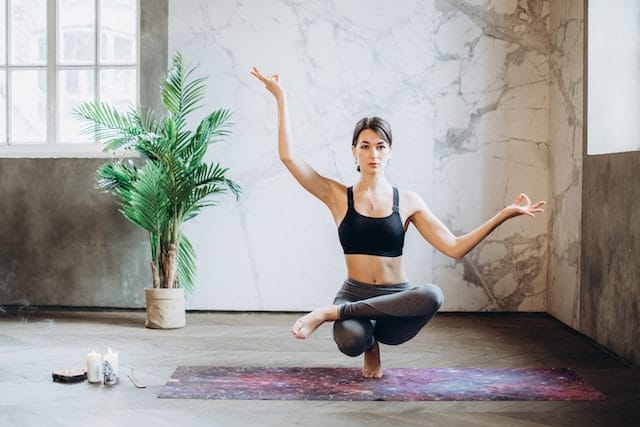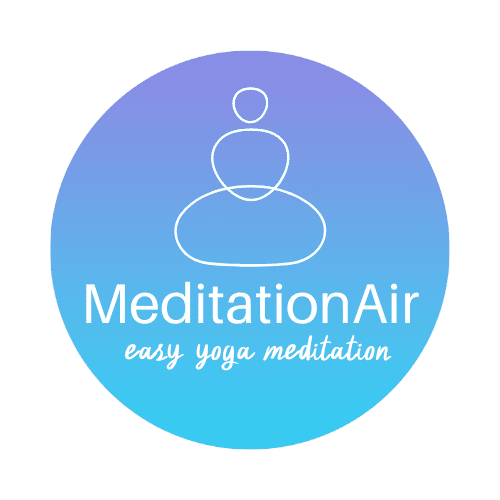Should I start with yoga or meditation? Are you feeling overwhelmed and stressed out? Are you looking for a way to improve your mental and physical health? You may have heard about the benefits of yoga and meditation, but you’re not sure where to start.
The good news is that both practices can help reduce stress, improve flexibility, increase awareness, and enhance overall well-being. But which one should you choose?
Before we explore the benefits of each practice, let’s create a little suspense by asking: What if there was a way to calm your mind, strengthen your body, and connect with your inner self? What if this practice could help you feel more present in the moment and less reactive to external stimuli?
Would you be interested in trying it out? If so, keep reading as we dive into the world of yoga and meditation to help you choose the right practice for you.
Understanding the Benefits of Yoga

You’ll discover the many advantages of practicing yoga, including increased flexibility, improved strength, and reduced stress. Yoga is a physical practice that involves stretching and holding poses while focusing on your breath. This combination of movement and mindfulness can help you build strength in your muscles while also calming your mind.
One of the main benefits of yoga is increased flexibility. As you move through different poses, you’ll be stretching your muscles in new ways, which can help improve your range of motion over time.
Additionally, yoga can help improve your balance and coordination as you learn to control your body in different positions.
Another advantage of practicing yoga is reduced stress. The focus on breathing and mindfulness can help calm your mind and reduce anxiety levels. Additionally, the physical activity involved in yoga can release endorphins, which are natural mood-boosters that can leave you feeling more relaxed and content.
As you explore the benefits of yoga, keep in mind that it’s not just about getting into shape or improving flexibility – it’s also about finding inner peace and balance.
With regular practice, you may find yourself feeling more centered and grounded both on and off the mat.
Now let’s take a look at how meditation can complement these benefits even further.
Exploring the Benefits of Meditation

There are a lot of benefits of meditation. If you’re looking to reduce stress and anxiety in your life, meditation may be the perfect solution for you.
By taking just a few minutes out of your day to focus on your breath and clear your mind, you can experience a significant reduction in feelings of overwhelm and tension.
Additionally, regular meditation practice has been shown to improve mental clarity and enhance overall well-being, making it an invaluable tool for anyone looking to lead a more balanced life.
Finally, one of the greatest benefits of meditation is its portability – with no special equipment required, it can be practiced anywhere at any time.
Reduces Stress and Anxiety
Feeling stressed or anxious? Try incorporating some yoga or meditation into your routine to help ease those feelings. One of the many benefits of meditation is that it can reduce stress and anxiety levels. When you meditate, you focus on your breath and let go of any thoughts or worries that may be causing tension in your body. This helps to calm your mind and relax your muscles, which in turn can reduce physical symptoms of stress like headaches, muscle pain, and fatigue.
To understand just how powerful meditation can be in reducing stress, take a look at this table:
| Before Meditation | After Meditation | Change | |
|---|---|---|---|
| Heart Rate | 80 bpm | 65 bpm | -15 |
| Blood Pressure | 140/90 mmHg | 120/80 mmHg | -20/-10 |
| Cortisol Level | High | Low | -25% |
As you can see, just a few minutes of meditation has the power to significantly decrease heart rate, blood pressure, and cortisol levels (a hormone associated with stress). By incorporating this practice into your daily routine, you may find yourself feeling more relaxed and less anxious overall.
Now that you know about the stress-reducing benefits of meditation, it’s time to learn about another great advantage: improved mental clarity.
Improves Mental Clarity
Improving mental clarity can be achieved through incorporating meditation into your daily routine, allowing for a clearer and more focused mind. With regular practice, you’ll notice an improvement in your ability to concentrate on tasks at hand, as well as an increased awareness of your thoughts and emotions.
Meditation has been shown to increase grey matter in the brain, which is responsible for processing information and improving cognitive function. Meditation can also help reduce mental clutter by promoting mindfulness and present-moment awareness.
This means that instead of being overwhelmed by racing thoughts or worries about the future, you’re able to stay grounded in the present moment and focus on what is happening right now. By clearing away mental distractions and cultivating inner stillness, you’ll find it easier to make decisions with clarity and precision.
Can be Practiced Anywhere
Meditation can be practiced anywhere, making it a convenient and accessible tool for improving mental clarity and reducing mental clutter. You don’t need any special equipment or space to meditate – just find a quiet place where you won’t be disturbed. This could be your bedroom, a park bench, or even a bathroom stall during your lunch break at work.
With regular practice, meditation can help you cultivate focus and concentration, reduce anxiety and stress, and increase feelings of calm and well-being. Of course, the portability of meditation doesn’t necessarily mean that it’s the right practice for everyone.
If you’re someone who struggles with sitting still or has trouble quieting your mind, starting with yoga might be a better option. Yoga combines physical movement with breath control and mindfulness techniques to help you build strength and flexibility while also calming your mind.
Ultimately, choosing the right practice for you depends on your personal preferences and goals – so take some time to explore both options before deciding which one is best suited for your needs.
Should I Start with Yoga or Meditation?

Finding the perfect practice for your mind and body can feel like wandering through a beautiful but overwhelming garden. With so many options available, it’s important to choose the right one for you. Whether you’re looking to start with yoga or meditation, it’s essential to consider your goals and preferences. Combining yoga and meditation is also very possible.
Yoga is a physical practice that involves various postures, or asanas, which are designed to strengthen and stretch the body. It also incorporates breathing techniques and meditation, making it a well-rounded practice for both the mind and body. If you enjoy movement-based practices or want to improve your flexibility and strength while also reducing stress levels, yoga may be the perfect choice for you.
On the other hand, if you’re looking for a more inward-focused practice that emphasizes mental clarity and relaxation, meditation may be more suitable. Meditation involves training the mind to focus on the present moment by calming down racing thoughts and emotions. This can help reduce stress levels, increase self-awareness, and promote better sleep quality. Consider trying both practices before deciding which one resonates with you best!
| Yoga | Meditation |
|---|---|
| Physical practice involving postures | Focuses on training the mind |
| Strengthens & stretches body | Reduces stress levels |
| Incorporates breathing techniques & meditation | Increases self-awareness |
| Improves flexibility & balance | Promotes better sleep quality |
Remember that there is no right or wrong answer when it comes to choosing between yoga or meditation – ultimately, what matters most is finding a practice that feels good for your unique needs. Take some time exploring different classes or styles until you find one that resonates with you best. And don’t forget – even if you start with one practice now, there’s always room to explore new practices in the future!
Frequently Asked Questions
What are the main differences between yoga and meditation?
Picture yourself in a serene environment, calm and peaceful. You’re looking for ways to improve your overall well-being and have heard about yoga and meditation.
While both practices promote relaxation and mindfulness, there are some key differences between the two. Yoga involves physical postures, breathing techniques, and meditation as a part of its practice.
Meditation, on the other hand, focuses solely on quieting the mind through various techniques like visualization or breath awareness. However, both practices share common benefits like reducing stress and anxiety while increasing self-awareness.
Ultimately, it’s up to you to decide which one resonates more with you based on your goals and preferences.
Can yoga and meditation be practiced together?
Yoga and meditation can be practiced together to enhance your overall well-being.
Many yoga classes incorporate meditation into their practice, as it helps calm the mind and brings focus to the present moment.
Similarly, practicing yoga before or after meditation can help prepare the body for stillness and improve flexibility.
Integrating both practices can also improve mental clarity, reduce stress levels, and increase self-awareness.
Whether you’re a beginner or experienced practitioner, combining yoga and meditation can provide a deeper level of relaxation and rejuvenation for both the mind and body.
Do I need to have any prior experience to start practicing yoga or meditation?
It’s okay if you don’t have any prior experience in practicing yoga or meditation. Both practices are open for beginners, and it’s always a good idea to start somewhere.
Whether you decide to begin with yoga or meditation is up to personal preference, but it’s essential to find a practice that resonates with you. Yoga can be physically challenging at first, but it offers many benefits such as increased flexibility, strength, and relaxation.
Meditation, on the other hand, can help reduce stress and promote mental clarity. Remember that both practices require patience and consistency; don’t worry about getting everything right from the beginning—just focus on showing up for yourself every day.
How often should I practice yoga or meditation?
To reap the benefits of yoga or meditation, it’s recommended to practice regularly. Ideally, aim for a daily practice, even if it’s just for a few minutes at first. Consistency is key.
However, if you can’t commit to daily sessions, try to practice at least 2-3 times a week. It’s important not to force yourself into a rigid routine that feels overwhelming or unmanageable but rather find a balance that works for you and your lifestyle.
Remember, the more you practice, the more you’ll notice positive changes in your mental and physical well-being. So start small and gradually increase your frequency as you become more comfortable with your practice!
Are there any specific health conditions that would make one practice more suitable than the other?
If you have a specific health condition, one practice may be more suitable than the other.
For example, if you suffer from anxiety or stress-related disorders, meditation can be incredibly helpful in reducing symptoms and improving overall wellbeing.
On the other hand, if you struggle with flexibility or chronic pain, yoga can help increase mobility and decrease discomfort.
It’s important to consult with your healthcare provider before starting any new practice to ensure it aligns with your unique needs and abilities.
Remember that both yoga and meditation offer numerous benefits for physical and mental health, so incorporating both into your routine can provide a well-rounded approach to self-care.
Conclusion
So, should you start with yoga or meditation? Ultimately, it’s up to you and your personal goals.
If you want to improve your physical health while also experiencing mental benefits such as reduced stress and improved focus, yoga may be the best place to start.
On the other hand, if your primary goal is to calm your mind and reduce stress and anxiety, meditation may be a better fit for you.
Regardless of which practice you choose to begin with, it’s important to remember that both yoga and meditation offer numerous benefits for both the body and mind.
By incorporating either (or both!) into your daily routine, you can improve your overall well-being and lead a happier, healthier life.
So don’t hesitate – take that first step towards finding inner peace today!
You may also like...
- Meditation For Seniors: How It Can Improve Cognitive Function And Memory? Best Benefits In 2023 Meditation For Seniors: How It Can Improve Cognitive Function And Memory As a senior meditation...
- Healing the Body Through Meditation – Does It Work? Is healing the body through meditation possible? Yes, and no. There’s ample research to show...
- Can Meditation Heal The Brain? 4 Ways It Works Can meditation heal the brain? Yes. Studies show that meditation can change the brain’s structure...
- Releasing Stress: Can Meditation Help Cancer Treatment? It’s easy to imagine how releasing stress can be beneficial for anyone, but what if...

